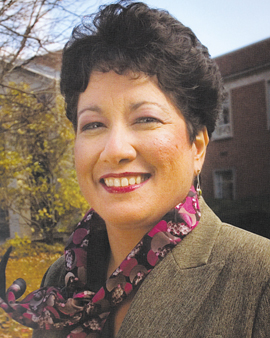
As part of its commitment to improve access and quality of healthcare for underserved populations, Drexel University College of Medicine has announced the creation of a new Office of Urban Health Equity, Education and Research. The office will be led by Ana E. Núñez, MD, professor of medicine and the director of the college's Women's Health Education Program, as well as principal investigator of its National Center of Excellence in Women's Health.
"Regrettably, health inequities are prevalent," said Núñez. "Whether it's age, gender, ethnicity, religion, sexual minority, immigrant, single-parent household status, etc., not everyone has access to the same level of health education and health care delivery. As innovative as the Philadelphia health care community is in terms of research, medical school curricula and health care delivery, we can still promote our excellence to a higher level by improving our outreach to and engagement with the communities we serve."
A national leader in community engagement, Núñez is currently the principal investigator on a community-centered initiative funded by the Department of Health & Human Services called the Philadelphia Ujima™ Project, one of 10 nationwide sites that serve as models of effective outreach and care.
In directing Drexel University College of Medicine's new Office of Urban Health Equity, Education and Research, Núñez and her team will work with various constituencies to engage and sustain the urban communities of Philadelphia by:
- Providing a dedicated office that connects urban-based health advocates and citizens with expert health care providers
- Joining educators and researchers with local health advocates to bring disease prevention information to urban communities
- Convening conversations with citizens and health care providers to seek solutions to complex health care issues
- Bringing the important perspectives of gender, trauma and social networks to research and education in health care delivery
- Promoting an urban culture that values health and wellness
"The goal of our office is to work together to promote self-care and health and to identify and replicate models with a realistic approach that will have a larger impact so that people become better, more informed health advocates – for themselves, their family, friends and colleagues," said Núñez.
Specific practical examples Núñez cites:
- Increasing awareness that blood pressure is under-screened and helping people get into care earlier to prevent consequences from untreated hypertension
- Improving skills and boosting confidence when it comes to reading food labels by playing a card game that helps people select the best food choices
- Increasing youth understanding about health by helping children select better snacks
- Aiding seniors in developing skills in physical activity that don't require expensive gym memberships or machines, but can help with mobility and minimize falls
- Identifying healthy aspects of close relationships and helping people become aware of signs of unhealthy ones
"Based upon our ongoing success with the Philadelphia Ujima™, we have a robust network of community collaborators and a model that has proven to be effective," Núñez said. "We are excited about expanding our current collaborations and identifying new individuals and organizations who wish to bring a movement of health awareness and self-advocacy into our vibrant, diverse city."